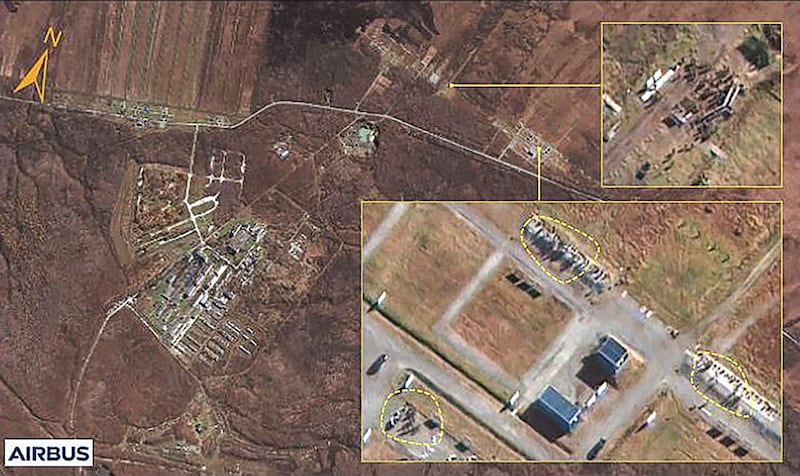Updated on Oct. 18, 2024 at 2:51 p.m. E.T.
South Korea’s spy agency said Friday that North Korea had decided to send “large-scale” troops to support Russia’s war in Ukraine, with 1,500 special forces already in Russia’s Far East undergoing training.
The National Intelligence Service, or NIS, released detailed satellite images it said showed a first deployment, saying it estimated the North could send around 12,000 soldiers in total.
The North was spotted transporting its special forces troops to Russian territory on a Russian naval transport ship between Oct. 8 and 13, according to the NIS.
North Korea and Russia have moved noticeably closer over the past year or more amid widespread suspicion that North Korea has supplied conventional weapons to Russia for its war in Ukraine in return for military and economic assistance. Russia invaded Ukraine in February 2022.
If confirmed, the move would be a rare foray by the long-isolated and nuclear-armed North into a foreign conflict.

About 1,500 North Korean soldiers were transported during the first phase, using four amphibious landing ships and three escort vessels owned by Russia, the NIS said.
These troops were moved from areas near the North Korean cities of Chongjin, Hamhung and Musudan to Russia’s Vladivostok, said the NIS, adding that a second phase of transport is expected to occur soon.
They have been stationed across various locations in the Far East, including Vladivostok, Ussuriysk, Khabarovsk and Blagoveshchensk and have been issued Russian military uniforms and weapons, according to the agency.
12,000 troops expected
The NIS said that they are expected to be sent to the front lines once they complete their “adaptation training,” adding that it expects a total of 12,000 troops, including those from the country’s most elite military units, could be deployed.
South Korea’s presidential office said Seoul has been closely tracking North Korea’s troop movement to Russia from the beginning in coordination with its allies, and will continue to monitor the situation and take all necessary measures proactively.
NATO chief Mark Rutte said Friday the alliance could not yet confirm South Korean intelligence’s report, but it is in “close contact” with its partners.
“At this moment, our official position is that we cannot confirm reports that North Koreans are actively now as soldiers engaged in the war effort," Rutte told reporters following a meeting of NATO defense ministers in Brussels.
“But this, of course, might change,” he said.
Rutte added NATO was “in close contact” with its partners, particularly South Korea, which was taking part in this week’s talks as part of the so-called Indo-Pacific Four, along with Australia, Japan and New Zealand.
“We will certainly have that conversation with them to get all the evidence on the table,” said Rutte.
Separately, EU spokesperson Peter Stano said in a statement: “Continued military support from the DPRK to Russia’s war of aggression against Ukraine will be met with an appropriate response.” The Democratic People’s Republic of Korea, or DPRK, is North Korea’s official name.
RELATED STORIES
[ Russia forming North Korean battalion amid soldier shortage: reportOpens in new window ]
[ Russia urges South Korea to avoid provocations amid drone dispute with NorthOpens in new window ]
[ EXPLAINED: Are North Korean troops going to help Russia in Ukraine?Opens in new window ]
On Thursday, Ukrainian President Volodymyr Zelenskyy cited Ukrainian intelligence reports saying that North Korean personnel had already been deployed in Russian-occupied Ukrainian territories, with an additional 10,000 troops being prepared to join the fight.
Zelenskyy suggested that Russia is relying on North Korean forces to compensate for its substantial troop losses, as many young Russians seek to avoid conscription.
South Korean Defense Minister Kim Yong-Hyun told lawmakers in early October that North Korea was likely planning to send troops to Ukraine to fight alongside Russia.
Kremlin spokesperson Dmitry Peskov on Oct. 10, however, dismissed the claim as “fake news.”
Russian President Vladimir Putin reportedly submitted the bill to the lower house of parliament on Monday to ratify the treaty with North Korea on a Comprehensive Strategic Partnership, which was sealed in June.
The treaty was signed by Putin and North Korean leader Kim Jong Un on June 19 in Pyongyang after their summit talks during the Russian President's state visit.
The new partnership includes a mutual defense assistance clause that would apply in the case of “aggression” against one of the signatories.
"Further evidence"
Kateryna Zakharchenko, a Ukranian journalist who reported on Oct. 4 that six North Korean instructors were killed near occupied Donetsk, told RFA Korean that in addition to her sources in the Ukranian military intelligence, citizens she has interviewed have confirmed the presence of North Korean soldiers.
"Yesterday, I spoke with residents of the occupied city of Mariupol, and they saw North Korean soldiers with their own eyes," she said. "In addition to Zelensky, Ukraine’s intelligence chief Kyrylo Budanov has officially confirmed this as well. He stated that about 11,000 North Korean infantry soldiers are being trained in eastern Russia to be sent to fight against Ukraine. They are expected to begin fighting in November."
Regarding the Kremlin's assertion that a North Korean troop presence was fake news, Zakharchenko said, she treats Russian statements as "pure disinformation and propaganda."
Moscow is bringing in North Korean soldiers to ease worries among Russians about conscription, she said.
"Putin cannot currently announce another large-scale mobilization publicly because the population will be unhappy, and Putin fears nothing more than his own people and possible protests," said Zakharchenko. "Therefore, it is easier for him to bring in North Korean soldiers. ... Putin knows that anti-mobilization sentiments are prevailing in his society, which is why he is seeking external support."
Edited by Malcolm Foster and Eugene Whong.
Update adds quotes from Ukranian journalist Kateryna Zakharchenko.
